Fort Lauderdale Addiction Treatment & Mental Health Resources Guide
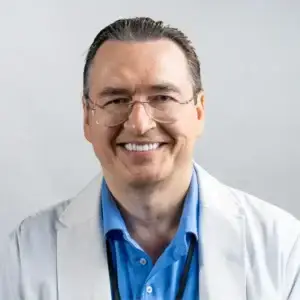
Dr. Rostislav Ignatov, MD
Chief Medical Officer
Fort Lauderdale faces a complex addiction crisis with uneven impacts across neighborhoods, yet the city and county maintain robust, publicly funded services, peer supports, and crisis lines that help residents find timely care and long-term recovery options.
In recent years, EMS naloxone administrations in Broward climbed from 1,180 (2018) to 3,066 (2022)—a ~160% rise—highlighting both need and response. County resources include detox/residential care, outpatient programs, Mobile Response Teams (MRTs), peer recovery, culturally competent supports, and transit-linked access. Still, barriers remain for uninsured and under-insured residents.
This guide explains how to access addiction, mental health, and substance use services in Fort Lauderdale and Broward County so you can navigate a complex—but well-resourced—system.
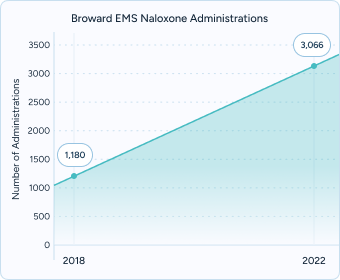
This growth marks sustained outreach and reverses earlier under-distribution. EMS and community partners scaled naloxone availability countywide; however, engagement with formal treatment remains uneven compared with harm-reduction utilization.

Across the Miami–Fort Lauderdale–Pompano Beach metro area, the share of adults reporting a major depressive episode in the past year has stayed consistent at about 4.9% (approximately 200,000 adults) between 2021 and 2024. For context, in 2020, the national rate of major depressive episodes was 8.4%. Over this period, rates in the South Florida metro consistently trended below both state and national averages. This stable trend makes the region a national outlier for relative stability, even as mental health service needs and provider shortages persist locally.

Roughly 17–18% of Broward high school students each year from 2021 to 2024 reported living with someone with a mental illness at home, highlighting a persistent challenge for youth well-being. In 2024, 17.9% of students reported this experience, in line with rates from earlier years. Exposure to mental illness in the household is closely linked to adverse childhood experiences and ongoing emotional health struggles among local teens.
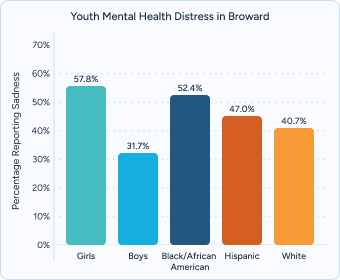
In 2022, mental health distress among teens in Broward remained notably high. Over half of all girls (57.8%) and nearly a third of all boys (31.7%) reported persistent feelings of sadness or hopelessness. Black/African American students exhibited the highest distress rates at 52.4%, followed by Hispanic students (47.0%) and White students (40.7%). These findings illustrate a severe and ongoing crisis for youth, with emotional health particularly strained among girls and students of color.
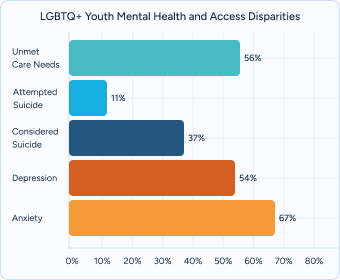
LGBTQ+ youth in Florida experience some of the state’s highest burdens of mental health distress. In 2024, 67% of LGBTQ+ youth reported recent anxiety and 54% reported feeling depressed. Alarmingly, 37% seriously considered suicide and 11% attempted it in the past year. Despite these elevated needs, 56% of LGBTQ+ youth who wanted mental healthcare did not receive it, highlighting persistent gaps in support for this vulnerable population.
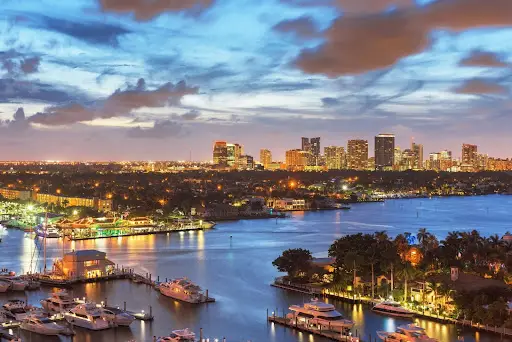
Broward Addiction Recovery Center (BARC) serves as a centralized access point for county addiction treatment information and referrals. Services include medical detox, residential treatment, outpatient services, and medication-assisted treatment (MAT), with clear admissions pathways posted online.
Mobile Response Teams (24/7) provide crisis intervention across Broward (including Fort Lauderdale), deploying to homes, schools, and community sites. For immediate support, call 988 for connection to local MRTs or the Crisis Line 954-463-0911 listed by NAMI Broward.
Transportation access via Broward County Transit (BCT) connects neighborhoods to county programs. Route maps and the TOPS! ADA paratransit service (door-to-door; $3.50 one-way) support riders with disabilities; Rider’s Choice can offer same-day taxi alternatives
Florida Medicaid covers many behavioral health services, including MAT medications such as methadone (per AHCA drug criteria). Florida KidCare eligibility extends up to 300% of the federal poverty level by statute; premiums/copays vary by program component and current implementation status. Florida Medicaid/KidCare cover eligible children and adults for crisis services (e.g., MRT linkage through 988), therapy, and medications. Residents can apply via the state portal or by calling program lines listed on agency sites.
The Florida Department of Children and Families (DCF) funds safety-net behavioral health care for uninsured/underinsured residents through the Broward Behavioral Health Coalition (BBHC) managing entity. Apply or get navigation help via BBHC resources.
Broward Addiction Recovery Center offers sliding-fee treatment and navigation for uninsured residents. Visit the BARC website or call admissions for public treatment slots.
Eliminate wait times with rapid screening, free insurance verification, comprehensive assessment, and medical detox when clinically indicated. Evidence-based therapies commonly offered include Eye Movement Desensitization and Reprocessing (EMDR), family therapy, and mindfulness-based relapse prevention to reduce relapse risk and support long-term recovery.
Private facilities often provide advantages over state-funded programs including:
Insurance verification typically completes within 24–48 hours. When clinically appropriate and beds are available, programs can coordinate same-day admission following medical clearance and consent.
The Haven Detox – Florida offers immediate access to evidence-based addiction treatment and mental health treatment serving the Fort Lauderdale area.
The facility combines traditional therapies like CBT and DBT with holistic approaches including Reiki, art therapy, and yoga, plus GeneSight genetic testing to personalize medications. With one of the highest staff-to-client ratios in Florida, the West Palm Beach location provides both medical detox and residential treatment in a comfortable, resort-like setting.
Neighborhood-specific offerings include youth and adult anxiety treatment programs, crisis walk-in services, supported employment programs, and faith-informed counseling options. Residents can also connect to resources through 211 Broward, a 24-hour referral and emotional support line, or through county co-responder initiatives that pair law enforcement with clinicians to provide trauma-informed crisis response.
Mental health services in Greater Fort Lauderdale span Central Fort Lauderdale, Wilton Manors–Oakland Park, and Hollywood–Dania. Residents have access to:
South Florida Wellness Network in Oakland Park (5225 NW 33rd Avenue) provides free peer-led recovery support, youth and family programs, sober social events, and wellness coaching. Evening and some weekend offerings are available; the site is transit-friendly.
NAMI Broward in Plantation (4161 NW 5th Street, Suite 203) offers no-cost peer groups for individuals and families, education classes, crisis-navigation resources, and both in-person and virtual options county-wide.
Fellowship RCO in Fort Lauderdale (101 SW 27th Ave, Unit 3) connects people to peer coaching, mutual-aid groups, community events, respite and recovery-residence supports through its Recovery Community Centers.
9Muses Art Center in Lauderhill (7139 W Oakland Park Blvd) is a peer-run drop-in center offering recovery through the arts, wellness activities, and support groups for adults—free of charge.
Rebel’s Drop-In Center in Davie (5595-B S. University Drive) provides a safe peer-support space 365 days a year with groups, social connection, advocacy, and peer mentoring.
FARR-certified sober homes provide structured, substance-free housing that follows national standards. The Florida Association of Recovery Residences (FARR)—the state affiliate of the National Alliance for Recovery Residences (NARR)—maintains a directory of independently inspected, certified residences. Use the FARR directory to verify a home’s certification and level of support (Levels 1–4) across Greater Fort Lauderdale and Broward County neighborhoods.
Program A offers FARR-certified facilities with on-site support, Wi-Fi, laundry, and parking. House expectations typically include weekly screenings, meeting attendance, and shared chore rotations. Please verify current certification and level in the FARR directory.
Program B provides FARR-certified residences with amenities such as keyless entry, curfews, and transportation assistance. Sobriety monitoring and regular community meetings are standard. Confirm current status and level (1–4) in the FARR directory.
Broward County AA Intergroup (aabroward.org) maintains a searchable list of meetings across Fort Lauderdale and greater Broward County with daily updates. The Meeting Guide mobile app (iOS/Android) syncs with Intergroup listings to provide real-time schedules, maps, and virtual options.
Spanish-language & LGBTQ+ AA meetings serve communities throughout Broward with in-person and online options. Check Intergroup and Meeting Guide for nightly schedules, language-specific groups, and inclusive spaces.
Narcotics Anonymous (NA) — South Florida Region (naflorida.org) operates a statewide helpline at (844) 623-5674 and lists hundreds of meetings each week across 16 areas, including Broward. Use the helpline or the regional meeting search for the most current locations and formats.
More mutual-aid options include SMART Recovery (smartrecovery.org) for science-based peer support and family groups such as Al-Anon and Nar-Anon, which offer meetings locally and online.
Comprehensive assessment should address both substance use and mental health together, with integrated care and family input for context.
Medication-assisted treatment (MAT) availability signals quality care. Programs should offer buprenorphine (Suboxone®), naltrexone (including Vivitrol®), and methadone when appropriate—always paired with counseling and behavioral therapies.
Culturally responsive care matters. Look for language access (e.g., Spanish/Creole), LGBTQ+-affirming and faith-informed options, and teams trained in cultural humility to reflect and serve your community.
A solid plan reduces relapse risk.
Aftercare coordination should begin during treatment, with warm handoffs to outpatient therapy, peer-led support groups, and recovery housing. Follow-up appointments are scheduled before discharge, and partnerships with community providers are maintained to ensure seamless, continuous care.
Family engagement and support improves outcomes through multi-family therapy sessions and practical skills workshops. Programs offer materials in multiple languages and culturally tailored formats to make participation easier and more meaningful for every family.
Clinical, personalized, and coordinated care
Subtitle: Professional programs reduce risk and improve outcomes.
Evidence-based therapies
Trauma-informed care, cognitive-behavioral therapy, and targeted treatments for co-occurring mental health needs form the core of recovery. Our clinical team invests in ongoing training, outcome tracking, and continuing education so care reflects the latest research and proven practices. This steady focus helps people build skills that last long after treatment ends.
Alumni networks and continuing care
Recovery grows with connection. Structured alumni programs, peer support groups, and regular check-ins keep encouragement close at hand beyond the first phase of treatment. Clients also receive practical tools—relapse-prevention planning, referrals, and resources—to navigate new challenges that may arise months or years later. Many services are available in person and virtually for flexible access.
Insurance coordination and advocacy
Dedicated benefits specialists help clients understand coverage, verify benefits, and secure authorizations as quickly as possible. We communicate with insurers, clarify costs, and guide families through each step so financial questions don’t delay care. Our goal is simple: remove barriers and make it easier to continue treatment.
Professional treatment represents an investment in recovery success, offering immediate access, personalized care, and comprehensive services designed to address the complex nature of addiction and mental health conditions.
Start with a confidential call
Benefits Verification & Costs
Specialists review eligibility and estimate out-of-pocket costs, coordinate Medicaid/KidCare or state-funded options, and clarify timelines—usually within 24–48 hours for most plans.
Assessment & Intake
Clinicians complete same-day evaluations (tele- or in-person), arrange detox or outpatient starts, and schedule follow-ups—minimizing delays with transportation and interpreter support as needed.
Most programs schedule an initial assessment within 48 hours, then connect you with a therapist based on your needs and insurance coverage.
Yes. SMMC and major Medicaid plans cover individual and group therapy; check your specific plan for copay details and provider networks.
Yes. Multiple community centers offer bilingual AA/NA meetings throughout Fort Lauderdale, with interpreters and native Spanish-speaking facilitators available daily.
Several nonprofit clinics provide sliding-scale fees and grant-funded treatment; inquire about financial assistance when contacting intake coordinators at community health centers.
Broward County Transit offers medical transport vouchers, and some treatment programs partner with ride services for clients without reliable transportation.
Crisis hotlines and mobile response teams operate 24/7—call 988 for immediate mental health support or 911 for medical emergencies requiring immediate intervention.
Yes. Family peer specialists offer confidential coaching through Al-Anon meetings, family therapy programs, and intervention planning services throughout Broward County.
Fort Lauderdale offers Spanish-language recovery groups, LGBTQ-affirming treatment programs, and Caribbean cultural support tailored to diverse community needs.
Yes. Several organizations operate college campus outreach, peer support circles for ages 18-25, and workshops designed specifically for students and young professionals.
24/7 Support
No Commitment
100% Private
There’s no catch. Checking your insurance is simply a way to see what your plan covers — it doesn’t lock you into treatment, notify anyone, or cost you anything. You get answers upfront to decide what makes sense for you.
Protecting your privacy matters! No information or notifications are ever sent to your employer or family — whether you check your insurance online or call. Everything is handled through secure, encrypted systems that meet strict medical privacy laws. You stay in control of your information!
Luckily, most insurance policies cover treatment here. Depending on the healthcare you’ve already had this year, costs could even be zero. Instead of worrying, let’s just find out what your plan covers.
Most likely. We work with major providers like Cigna, Aetna, and United Healthcare, public insurances like Tricare and tribal plans, and even smaller plans like Surest Bind and Harvard Pilgrim. The quickest way to know for sure is to check online or call. It’s a quick, private way to understand what is covered upfront.
Verifying your insurance isn’t a commitment to start treatment — it’s simply a way to see what your options are. Knowing your coverage ahead of time helps you make more informed, confident decisions. It also helps flag a spot, so you’re able to get right in if you ever do decide you’re ready.
You need your policy number to check your specific policy online. If you want general information, just call. You likely have questions beyond insurance anyway. Reaching out now helps you figure out the right fit if or when you’re ready. You don’t have to put off the call until you’re in crisis. Calling is not scary, I promise!